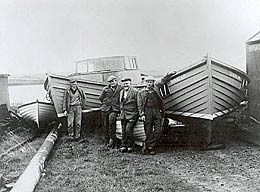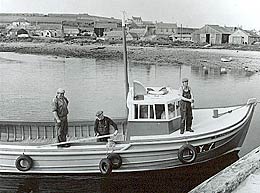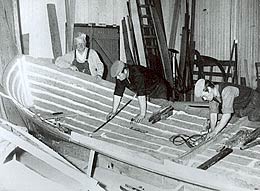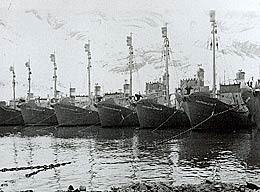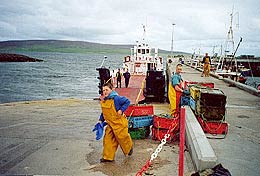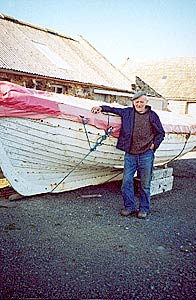
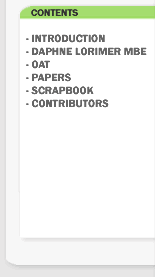

Orkney and the Sea - an Oral History Project |
|||||||||||||||
This article is based on a paper given to the Annual conference of the Scottish Oral History Group in Aberdeen in 2001 and to the Annual Conference of the Oral History Society in London in 2001 Project Volunteers : Helga Tulloch, Callum Robertson, Helen Chalmers, Ellen Casey, Alexander Annal, Scott Tulloch, Jenny Ireland
Given the number of people living in Orkney (currently the population stands at somewhere around 19,000 and falling) it has probably attracted more than its fair share of attention from folklorists and oral historians. Perhaps that is because there is something attractive about researching an island or a group of islands. A community limited by the sea somehow seems more 'do-able' than sprawling urban landscapes where you could carry on interviewing for ever. Undoubtedly island communities are likely to be self-sufficient. People who live here tend to work here and fulfil all their social, cultural and economic needs within the islands. There is no dashing over to Glasgow to the theatre or commuting to somewhere an hour and a half down the motorway. In this way differences between the island and the mainland are still apparent, there is a cultural difference with mainland communities and could be one of the reasons that the community in Orkney today has so much more continuity with its past. Oral history is not new in Orkney. There is a Sound Archive which has a collection of 2,000 recordings from as far back as the 60s. Alan Bruford from the School of Scottish Studies collected here, as did Ernest Marwick, a local folklorist. An MSC project in the 80s carried on collecting and many of the recordings from Radio Orkney end up in the Sound Archive. To date, there has been nothing published directly drawn from the existing Sound Archive. In the 60s a book produced by the BBC, recently reprinted (Brown & Meeham, 2002), used extracts from interviews about Scapa Flow and there have been occasional books from outside Orkney for which local people have been visited and interviewed. The Archive itself has published nothing and very little has been published which uses material from the Archive. Access to the Archive is awkward (as with all sound archives) and there are no current plans for digitisation. There is also a comparative scarcity of 20 th century histories of Orkney. The majority of published work is small work from amateur historians, usually about a specialist interest or pictorial travelogues. Most histories of Orkney stop at the end of the 19 th century with the exception of Scapa Flow between 1914 and 1918, and 1939 and 1945. There is no shortage at all of published work on the Vikings, Neolithic Orkney, the Sagas or Wartime Orkney. This project originated within the new department of Orkney Heritage, the local authority group of museums. It is funded by the Millennium Lottery Fund as a Millennium Volunteers' project and had two purposes; to provide voluntary work for young people between the ages of 16 and 24 within the community and to record memories of maritime Orkney.
The initial focus of the project was the volunteers, their training and interests. They had a travel budget allowing them to travel throughout the Isles, stay, record and return if they wanted to. They were also encouraged to pursue their own areas of interest. Some of the volunteers contributed perhaps only one or two interviews, others contributed far more. Where there were subject areas with insufficient interviews I supplemented the volunteer's work. The interviews were then partially transcribed and edited by me. The photographs were largely from the wonderful Orkney Photographic Archive or contributed by Interviewees and volunteers. The result is an eclectic collection of around 60 recordings plus video and photographs. They cover Mainland Orkney as well as the northern isles. Maritime Orkney was as much of a definition Orkney Heritage gave us and it was left to the volunteers and myself to decide on the limits of the project. Subjects included (forgive the list but it will give you an idea of the diversity of the subject): boat-building, banking, the Merchant Navy, belief, childhood, diving, eating, ferries, harbours/access, women, wrecks. Fishing included herring, creeling, inshore, offshore, clams and whaling. Shoreline included eggs, fowling, seals, sheep, ware, kelp and tangles. Rescue included the Coastguard, lighthouses, lifeboats. Although we tried our best to limit our subject areas once we started to explore memories it became apparent that every Orcadian has a diverse and broad relationship with the sea, something which worked to our advantage in the end as each person we interviewed usually had a contribution to make on several subject areas. In the end the project concentrated on the way Orcadians have made their living from the sea. Sailing for pleasure, as well as the most recent developments, such as salmon farming, have been excluded, for no better reason than a desire to draw a line somewhere. The War years were omitted simply because they have been well covered elsewhere. Interestingly, all but three of those recorded were Orcadian. From this list you can understand some of the problems we might have had doing the subject justice, particularly in the context of this being the first time that there has been an oral history publication in recent years. It is possible to learn something of the way Oral History can reflect a community. The first thing which struck me, working here after working in Yorkshire, was the high incidence of people refusing to talk to volunteers or myself. This partly reflects a natural reticence. One local reporter for the BBC compared his experience here with Shetland where they fight to talk to the microphone. In Orkney you get passed down the line with 'No, you don't want to talk to me.' until you get to the English person on the committee who, of course, will speak. It also reflects a small community's necessary reticence. Most people are perfectly well aware of the power of talk, of the spoken word. Because Orkney is enclosed a story or a piece of gossip is like a pebble thrown into water in a bucket.
Instead of the ripples extending ever outwards, disappearing, they hit the bucket and come back again. There is no chance for anonymity. To add to this there are the family ties that bind the community. When two Orcadians meet, nine times out of ten as soon as it is decently possible within a conversation, discussion starts as to how they might be related. This starts with your name, your maiden name, your place of residence, your place of birth, your mother's maiden name etc etc. It carries on until a link is established. Even for incomers this process is amended to where you live, how long you have lived there and some link there might be with their family and life. Only once have I known two Orcadians to remain stumped and completely unrelated at the end of this process. They now refer to each other as 'the one I'm not related to.' The knowledge of family is impressive and includes knowledge of second cousins (does anyone else even know what a second cousin is?), third cousin etc, going back several generations. It also means that individuals are known within the context of their family. Only some incomers are exempt from being known as part of a greater unit, the family, an extended family at that. Although it is true to say that, for any person, experiences and memories recorded are more than personal, that they do not stand alone but inter-link to a wider experience, this is particularly true in a small community.
This provides continuity and ties between people and generations. A sense of responsibility to family and therefore community means that talk is not completely free. A conversation is a knowing process. Incomers soon learn to watch what they say and to whom. Most have experience of being in the middle of a good moan about someone and finding out that they are talking to their cousin (second or otherwise). This means that interviewees are more informed than elsewhere. They may not know quite what you are after or why, but they are more likely to keep control of what they say. Oral testimony is valued and exists within different contexts, that of story-telling, not just a formalised Arts Council experience but of passing the time having a yarn, of valuing the ability to tell a story, to pick aspects of life, people and events and which are often repeated amongst friends at social occasions. These need not be from direct experience but can just be stories and circumstances which have appealed to a story-minded Orcadian. I have heard stories and anecdotes which I have told turned into literate and witty stories by Orcadians who thought they were worth repeating. Twice I gave a draft copy of the book to Orcadian friends for their opinion and have been frustrated to listen to a stream of stories and anecdotes remembered in response to the book, rather than the constructive criticism I was hoping for, but this is perfectly in keeping with 'I've heard one of your stories, now here's one I know' kind of conversation. It is not written public history but public history nonetheless.
The ways in which talking is important to the community are demonstrated by the way in which people talk about different subjects. For example, wrecks were an important part of the livelihoods of the communities. Cargo being washed ashore, everything from timber to apples, tins and teddy bears. Pirating, going with boats in the dead of night to take what they could, wrecking obsolete boats for the insurance, scrapping of the wrecks, salvage rights. Wrecks were an important part of the livelihood of an island. Timber from a wartime wreck on North Ronaldsay enabled islanders to build henhouses and participate in a burgeoning egg industry, vital to the North Isles for decades. Interviewees talked about houses made and filled with objects that have been somewhere before. Each wreck brings its idiosyncratic and unpredictable rewards. Each wreck leaves its own memorial on the island in the shape of a cargo of timber, pan from the galley or, more sadly, a gravestone. Wrecks have all the ingredients of fine stories, with drama and often adventure, resolved by the sinking of the ship and distribution or disposal of goods. When talking about wrecks, most have clear memories about the names of the ships, the circumstances and events. Sometimes it is not until later in the interview that you become aware that the wreck they are talking about happened in 1895 and they cannot have any personal memory of it. Although they weren't there the memory is one they treat as being their own. The memories are community memories, each person perhaps has their own point of view, but they belong to the memory bank of the community, recalled often in social circumstances. Each story in its re-telling confirms the identity of the community: bravery and courage rescuing survivors; cunning in eluding the customs men; great seamanship overcoming appalling weather conditions; ingenuity enabling men to get more from a wreck than a rival group of pirates from another island; creativity allowing everything rescued from the sea to be re-used. Each story reinforces a community overcoming a difficulty or threat from outside. Creeling, laying down traps for shellfish, has been in existence since the 19 th century. Until after World War II, this was almost entirely a part-time occupation with two people operating a boat, often neighbours, brothers or a husband and wife. Lobsters were caught and sold for cash and then sent south. They filled a crucial few months when winter food stores were running low but the harvest was not ready. After the War, technological improvements meant that it was possible lay more creels in deeper water. Faster boats meant that you could get round more creels in a day. In short, there was money to be made. Then the lobsters were largely fished out, the Flotta oil terminal opened and many of the 'boaty' men went into the oil industry. In the 80s, however, a market opened for partans (crabs) and once more there was a boom as virgin fields opened, only slowing now with stocks reducing again. The stakes are now much higher as investments in boats and high running costs can only be re-couped with high catches and good prices. With fish stocks going down, the subject is potentially one of great conflict. There is much discussion about causes and blame. Tales are told against other members of the community, about their foolishness over-fishing, of boats being rivals and coming into conflict with each other, of ways of resolving the situation. The community memories of creeling become fragmented according to the narrator's generation and stake in the industry. Incomers are often more vocal in criticism and challenging.
Changing work patterns reflect this. Fifty years ago lobsters were caught by those fishing in pairs made up of family and friends. Now commercial boats have an owner with a crew which changes according to the market demands and employment rewards. It is not uncommon to find rival boats owned by members of the same family. As important as the subjects talked about of course, are the silences and, as you would expect, the silences reflect the taboos of the community. Interestingly this does not include some forms of illegal activity. In a community where more pedestrian crimes of dishonesty are almost unknown, stealing from wrecks is seen as a matter of casual conversation. Landing illegal fish is seen as a reasonable way of coping with the contrary demands of making a living and meeting increasing legislation from outside. What it does include are homosexuality (in the Merchant Navy); the links between alcohol problems and making a living at sea; bereavement and loss; accidents, and family rifts and squabbles. Another silence which is clear is the story of the incomer. It is the Orcadian experience which is seen as important to the community, worth recording, worth repeating, worth archiving. Suggestions that the experience of the incomer may be worth recording are almost always dismissed. Most incomers collude in this and are even more vociferous in their defence of this choice. This, it can be speculated, may relate to their own identity, the reasons they came to live in Orkney and the reasons they stay. The definition of incomer is fairly tight. It is where you were born and who your parents are. If you have a choice about who you would like to interview there are almost no occasions when an incomer would be chosen over an Orcadian. This is connected with the age of those you interview as the majority are in their 60s and 70s and, of those, few are incomers. It is taken for granted that the core of the community is Orcadian and that incomers are peripheral. It is the question of the silences which leads to questions about what kind of role an oral historian might have in a community such as this. Is it to challenge the silences? Is it to reflect back the community's own perception of itself? As an oral historian, my own professional responsibilities are amplified and altered by living here and being part of the community, even as an outsider. While interviewing about a particular subject I came across two people who represent two sides of a change in working practice. It would be so sweet to put them side by side in the book but I won't because I know they know each other; they are friends and have worked together for many years. They would probably take it in good part but it would be inappropriate for me to risk embarrassing them both. It would be too uncomfortable for me personally to meet them again after doing something like that. It is interesting to speculate whether there may be any great advantage or disadvantage being local or an incomer. Undoubtedly I miss many of the resonances in interviews. I know of one occasion at least when I interviewed a member of a family without realising that he had not been speaking to another family member for years and that for many reasons personal to myself I would have to make sure I interviewed them both. There are no shortages of barriers and incomers do not have a monopoly on them. All the volunteers were Orcadian and still age, class, gender and coming from a different part of Orkney managed to create barriers all their own.
There is much made in Orcadian life of the impact incomers have had in Orkney but I would suggest that, within the context of oral history, being an incomer is only one of many variables and less important than some. There are advantages in interviews in representing some kind of 'other'. The telling of memories and experiences can be much richer when you have a sense of telling someone who might not have heard them before. An oral history interview is a unique construct and has more variables to it than arise from an identical background to your interviewer. The only aspect where you could say an incomer unequivocally misses out is language. Orcadian speech is full of words, structures and allusions, modified when speaking to an incomer. I would tend rather more towards reflection than challenge. When a friend comes to you and talks about her life, the art of a good friend and a good listener is not to challenge or contradict what she says but to listen and reflect her feelings and thought back to her, enabling her to understand herself more clearly. I don't think there is any contradiction in an oral historian taking this role as long as it is done accurately and well, without sycophancy. In the past, outsiders have come into Orkney, recorded what they wanted, then left, sometimes returning but publishing elsewhere. Or local people have recorded memories but have archived them without any real dialogue about the work they have done with the people who have been recorded or even other people within the community since so few people use the archive. This I feel is, in a sense, cheating. Spending years recording for archive purposes then never publishing does not allow any dialogue with those whose history is being recorded. I seriously considered taking a short holiday around the time of publication. There is much discussion in Oral History circles about the ethical responsibility of oral historians 'post-interview' but I knew that my name was in the phone book and I would be hearing very directly from those who weren't happy about the treatment of their contributions. I had the prospect of a lifetime of bumping into cross interviewees and volunteers in Safeways if I got it wrong. Although all the interviewees had the opportunity to read a draft copy of the book and make comments or changes to their testimony and most got their copy a day or two before it hit the shops, I was still nervous about their reaction. Thankfully over the weeks following publication many of the interviewees called me at home and spoke to me about their reaction. It was overwhelmingly positive. In fact it seemed that, once presented with the finished article, the value of oral history was apparent. In some senses, Oral History only has a place in a community with publication. I am very pleased to say that one of the volunteers from the project, Helga Tulloch, will shortly be publishing her first oral history book about farming in Orkney so it seems that Orkney and the Sea may be the first of many oral history publications generated and published in Orkney. References
|
|||||||||||||||


